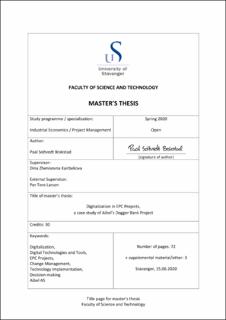| dc.description.abstract | In recent years, many industries have effectively used digitalization to attain control, and the term has been on the agenda of organizations for years. Digitalization and digital transformation are predicted to be crucial for leaders to plan for and implement across industries for the years to come. In the rapidly accelerating industrial environment, there is a widespread recognition that the role of digitalization is shifting – from a buzzword that everyone is questioning, to now be a catalyst of innovation and disruption. Due to this heavy focus on digital technologies, decisions must be made to avoid the risk of falling prey to competitors and disruptors.
Aibel AS has been awarded a major EPC contract by the SSE Renewables and Equinor consortium to deliver 2(3) HVDC platforms for the Dogger Bank project in the UK part of the North Sea. The converter platforms will be a part of the world’s largest offshore wind farm, with a combined capacity of up to 3,6 GW, and are expected to produce enough energy to power the equivalent of 4.5 million UK homes. Through years of experience in complex offshore projects, Aibel knows what it takes to be profitable in such a project. However, the potential of digitalization and innovative digital technology could improve project profitability and increase their competitiveness for future contracts.
This thesis investigates how digitalization, digital technologies, and tools can be used to streamline and create value in an offshore wind platform project. It explores these new technologies’ relevance to EPC projects in general and recommends how they can be implemented successfully. In addition, the study considers how digital change management affects technology implementation. To answer these objectives, the thesis addresses the following research questions:
RQ1: Which digital technologies and tools can be implemented to create value and streamline an offshore wind platform project.
RQ2: How could these initiatives and technologies be successfully implemented.
The findings suggest that solutions like extended reality and smart devices in field operations, along with greater connectivity through digital yards, twins, and workplaces, allow more remote operations that are highly valuable. When combined with construction automation technologies, and gradually also artificial intelligence and machine learning, EPC projects can be enhanced in most areas with the aid of digital technology. The analysis also highlights the importance of digital change management in the facilitation and how the implementation process affects the profitability and success of technologies. | en_US |
